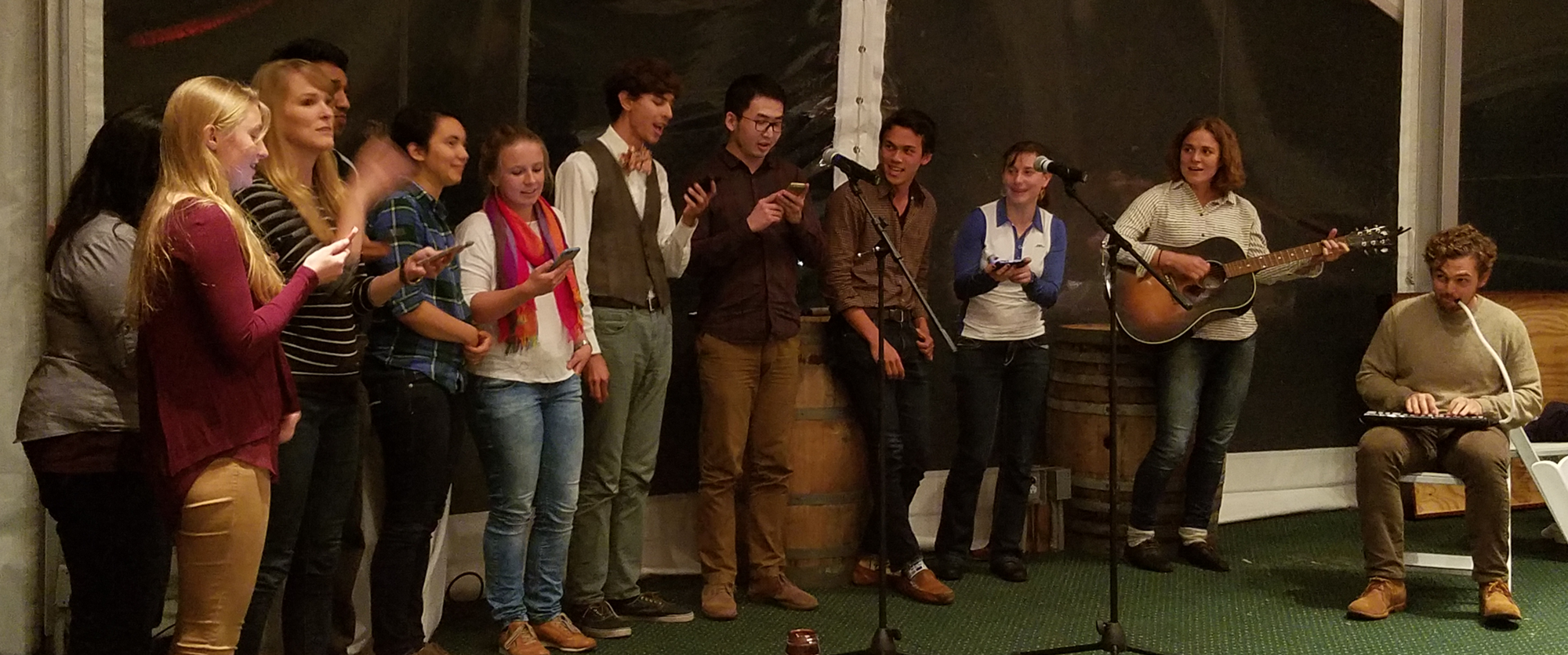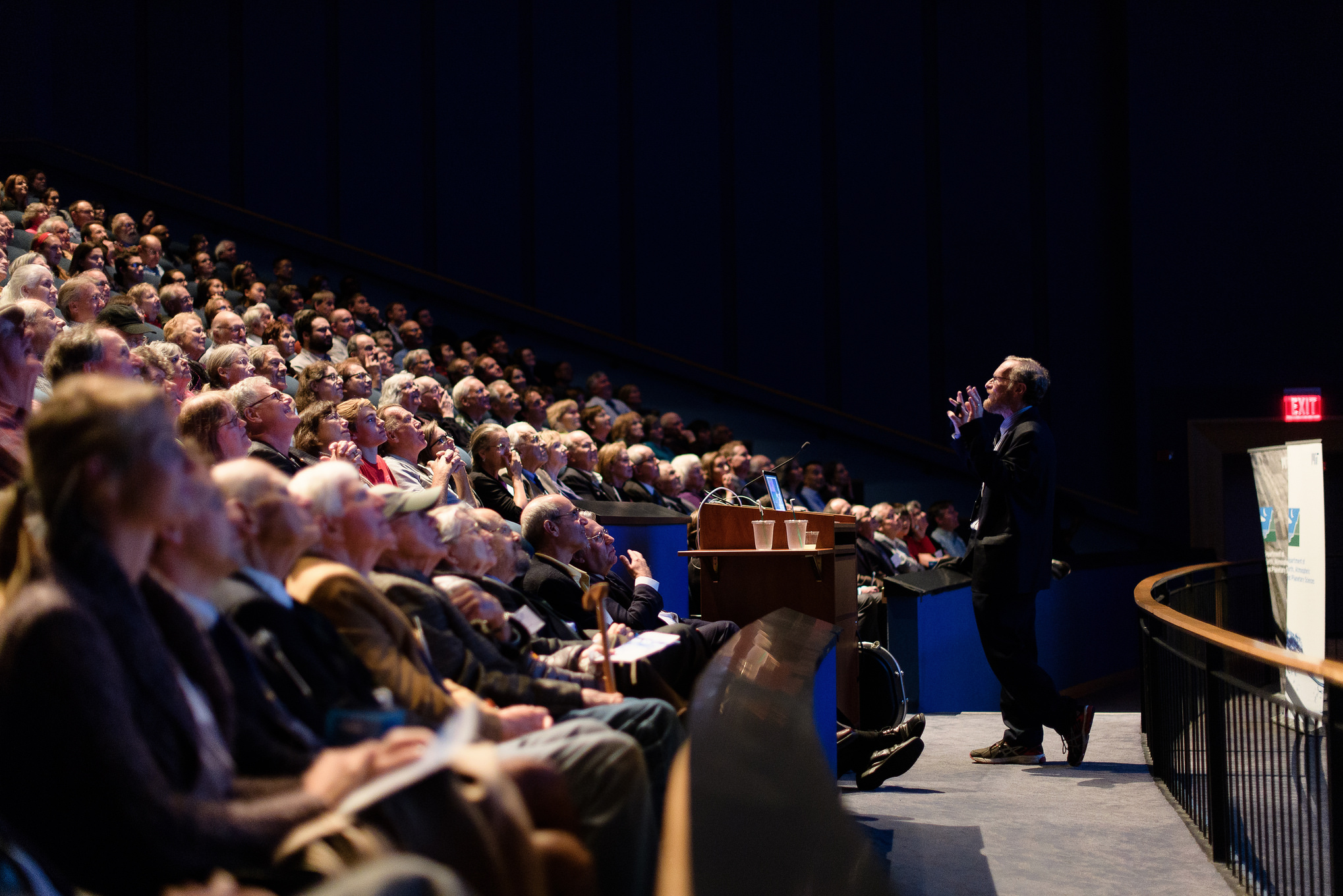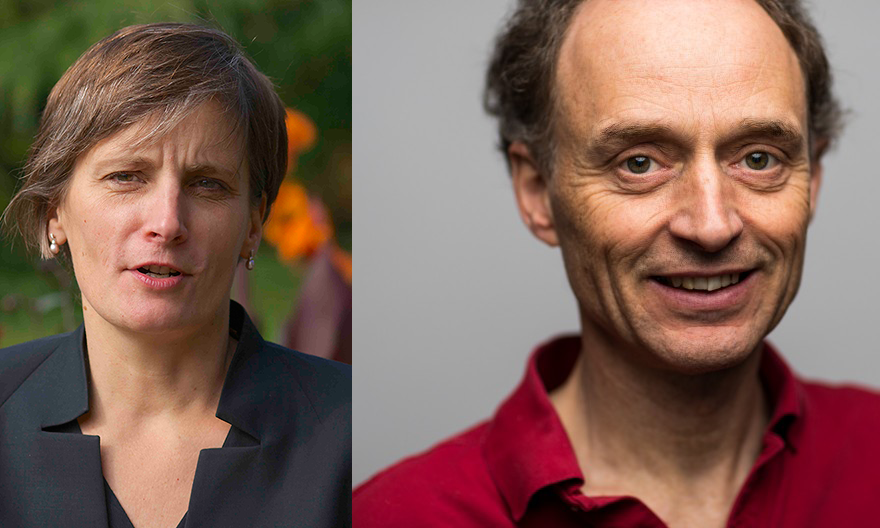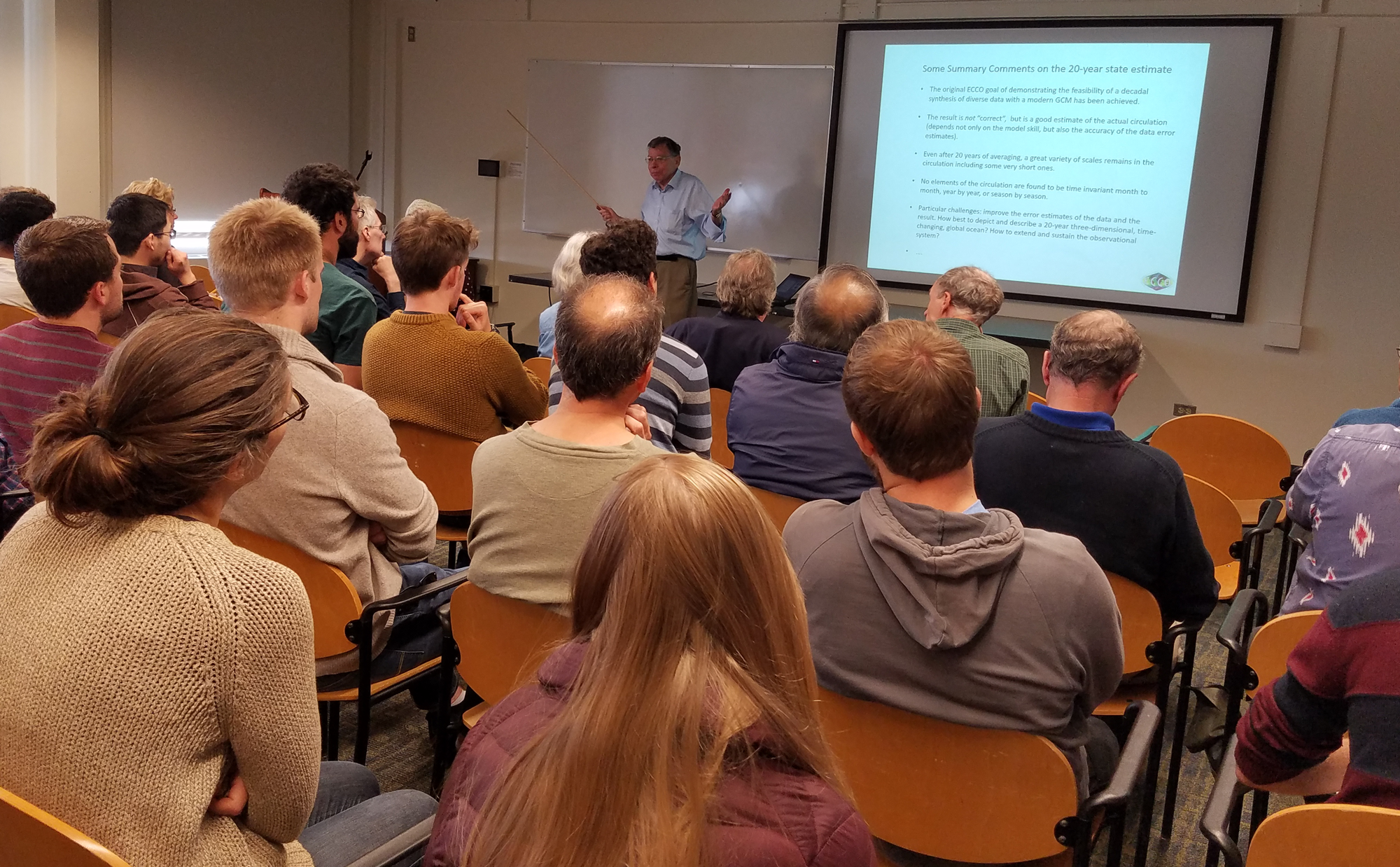PAOC Spotlights
Fall 2016 in PAOC
With the semester in full swing, PAOC members are enjoying several new, engaging and fun events happening in the department.
The PAOC Retreat (9/30 – 10/2/16)

The weekend of September 30th - October 2nd was the annual PAOC retreat. Generously subsidized by the Houghton Fund, PAOC members and guests ventured to the Ocean Edge Resort in Brewster, MA for mornings of lively scientific discussion and afternoons of outdoor recreation, topped off with evenings of merriment.
Each year, the PAOC Retreat Committee focuses the group’s attention on a particular issue affecting the community. Discussions during this retreat centered around “Sustainable Development in Light of Climate Change” and were anchored by talks from Larry Susskind, an MIT Professor and Head of the Environmental Policy and Planning Group, Carl Spector, Commissioner of the Environment Department for the City of Boston, and Payal Parekh, Program Director at 350.org. The weekend closed with a “State of PAOC”—summarizing how PAOC has changed since last year’s retreat, looking ahead to the year’s upcoming research and open discussion about how PAOC can be improved.
Peer back into time at previous PAOC Retreats!
Carlson Lecture (10/13/16)

Created in 2011, The John Carlson Lecture communicates exciting new results in climate science to the general public and is made possible by a generous gift from MIT alumnus John H. Carlson to the Lorenz Center in the Department of Earth, Atmospheric and Planetary Sciences, MIT.
Previous talks have covered topics from Predicting Climate in a Chaotic World: How Certain Can We Be? to Big Cats, Panamá, and Armadillos: A Story of Climate and Life. Lecturers have specialized a variety of topics ranging from climate dynamics to meteorology to geology.
This year, MIT’s Lorenz Center has invited Dr. Richard Alley, the Evan Pugh University Professor of Geosciences in Penn State's College of Earth and Mineral Sciences, to discuss "Big Ice: Antarctica, Greenland, and Boston" on Thursday October 13th, 7-9 pm at the New England Aquarium’s Simons IMAX Theatre.
An ice sheet is a two-mile-thick, continent-wide pile of old snow, spreading under its own weight and sculpting the land beneath. The ice sheet that buried Boston 20,000 years ago melted when slowly acting features of Earth’s orbit raised summer sunshine and atmospheric CO2, warming the climate. The history of that Ice Age can still be read in Boston Harbor, and in the layers of the surviving ice sheets on Antarctica and Greenland. But, more warming may melt those ice records, as break-off of huge icebergs and outburst floods speed sea-level rise.
Alley’s research focuses on glaciology, sea level change and abrupt climate change. He is widely credited with showing that the earth has experienced abrupt climate change in the past—and likely will again, based on his meticulous study of ice cores from Greenland and West Antarctica.
Read about previous lectures: 2015: Cloud Watching and 2014: Peter Molnar Takes Down a Popular Scientific Theory at the 2014 John Carlson Lecture
Houghton Lectures

Since the inaugural Houghton Lecture in 1995, over 30 outstanding scientists from across the globe—specializing in disciplines within the fields of Atmosphere, Ocean and Climate—have visited MIT and shared their expertise with PAOC members and the institute’s community. Invited researchers stay for periods ranging from a week to a semester. During their time here, they typically present several lectures in addition to collaborating with PAOC students, staff and faculty.
Corinne Le Quéré and Chris Bretherton are this semester’s Houghton lecturers.
Corinne Le Quéré is Professor of Climate Change Science and Policy at the University of East Anglia (UK) where she conducts research on the carbon cycle and its interactions with the Earth’s climate. Her research has helped to determine how and why the natural carbon reservoirs are changing, particularly in the Southern Ocean. She spearheaded the development of marine carbon-cycle models with new ways to represent plankton biodiversity and ecology.
Corinne is director of the Tyndall Centre for Climate Change Research, and member of the Scientific Committee of the Future Earth platform for global sustainability and of the UK Committee on Climate Change. She authored several assessment reports of the Intergovernmental Panel on Climate Change (IPCC), and leads an annual update of the ‘global carbon budget’ by the Global Carbon Project, an international effort to keep track of global carbon emissions and their fate in the environment. She was elected Fellow of the Royal Society in 2016.
Chris Bretherton is an atmospheric scientist who studies cloud formation and turbulence and improves how they are simulated in global climate and weather forecast models. His research includes participating in field experiments and observational analyses, three-dimensional modeling of fluid flow in and around fields of clouds, and understanding how clouds will respond to and feed back on climate change. Computer code developed by his research group for simulating cloud formation by atmospheric turbulence is used in the two leading US climate models: the NCAR Community Atmosphere Model, version 5 (CAM5), and the GFDL Atmosphere Model, version 3 (AM3).He was a lead author of the Intergovernmental Panel on Climate Change Fifth Assessment Report in 2013 and a former director of the University of Washington Program on Climate Change. In 2012, he received the Jule G. Charney Award, one of the two highest career awards of the American Meteorological Society. He is a Fellow of the American Meteorological Society and the American Geophysical Union.
1) Corinne Le Quéré: The contemporary global carbon budget. Friday, Oct. 7th, 9am.
2): Corinne Le Quéré: Marine ecosystems and ocean acidification. Friday, Oct. 14th, 9am.
3): Corinne Le Quéré: Potential and risks of Carbon Geoengineerin. Friday, Oct. 21st, 9am.
4): Corinne Le Quéré: Reaching net zero carbon balance in the 21st Century. Friday, Oct. 28th, 9am.
5) Chris Bretherton: Humidity-cloud-precipitation feedbacks and convective organization.Thursday, Nov. 3, 2pm.
6) Chris Bretherton: Insights from high-resolution simulation of cloud feedbacks.Thursday, Nov. 17, 2pm.
7) Chris Bretherton: Ultraparameterization: Using large eddy simulation for global simulation of boundary layer clouds and climate.Thursday, Dec. 8, 2pm.
The PAOC Colloquium (Mondays from noon to 1pm)

PAOC members study everything from exoplanets to atmospheric science and oceanography, so while collaborations often happen across the department, it’s not unusual for groups to become focused on their own work and miss out on intradepartmental ongoings, current research and interactions.
A new seminar series, the PAOC Colloquium, has been designed to bridge these gaps.
The PAOC Colloquium is a weekly interdisciplinary seminar series that brings together the whole PAOC community. Speakers are invited from MIT and across the globe to give formal talks on research concerning physics, chemistry, and biology of the atmospheres, oceans and climate, but discussions occasionally include related topics like the societal impacts of climatic processes. They take place on Monday from 12-1pm in 54-923, and lunch is provided after the seminars to encourage students and post-docs to meet with the speaker.
While on campus, individual meetings with professors, post-docs, and students will be arranged with the guest. The 2016/2017 coordinators for the PAOC Colloquium are Christine Chen, Tom Beucler, Deepa Rao and Madeleine Youngs.
Other seminar series that were established before the PAOC Colloquium, like MASS, SLS and COG3, will continue but as informal (and perhaps more technical) discussions with interested members. Unlike the new PAOC Colloquium, the structure of these seminars may vary from week to week. Guests from within and outside MIT may be invited to speak about a study or discussion may focus on a particular paper pertinent to that field.
We hope that PAOC and the broader MIT community will take advantage of these new opportunities.